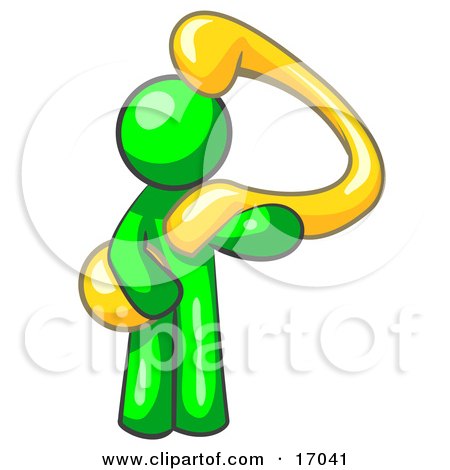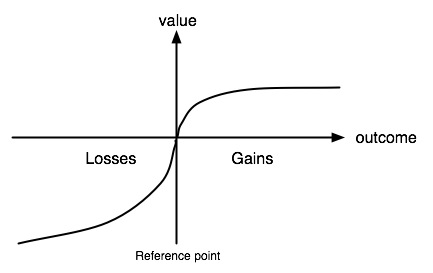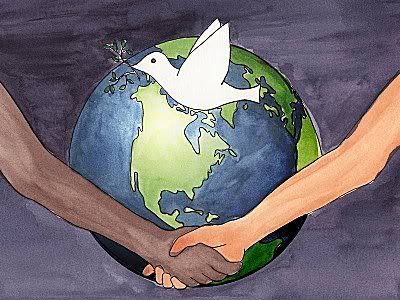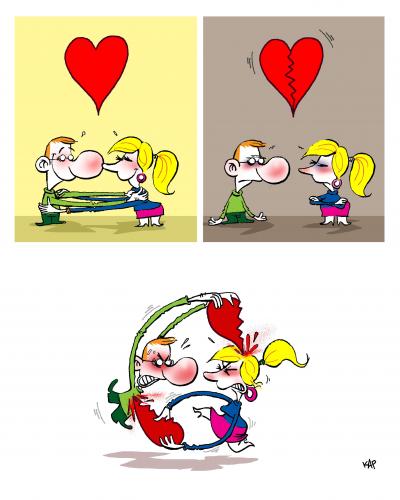Sunday, December 27, 2009
My Pendulum Theory
Many documentaries were broadcast to mark the anniversary and I watched one describing the fall of the Berlin Wall. One little story in this documentary made a big impression on me. It was about an East German lady in her fifties, working for the local ice cream factory. Apparently, there was a constant ice cream shortage in East Germany and the entire quantity this factory produced was always sold in an instant. When western goods started to be sold in eastern shops, people stopped buying eastern products, among them ice cream. After the eastern ice cream could not be sold, the shopkeeper asked the factory to take its products back. This lady came and tried to convince clients to buy her factory's ice cream by explaining that otherwise the factory will be closed down and the workers will become unemployed. The clients couldn't care less. One client even replied that he was fed up with this ice cream for 40 years while it was the only one available and now he was taking his revenge. This woman disposed the refrigerator and its contents. A few month later the factory closed down and she was unemployed.
Lately, people are nostalgically reviving former East German products, including Trabant cars. A new word, "ostalgie", has been coined for the phenomenon.
These days people are buying agricultural products from local farms, for helping them stay in business and for saving transportation carbon dioxide, and non-profits help the unemployed, although volunteering and civil society are much weaker in the east than the west.
Initial large pendulum swings are human and understandable, but after 20 years, the pendulum motion has slowed down, swings are more moderate.
Friday, December 25, 2009
Logic
I hope he applies more logic to his IDF work, otherwise this country is in real danger.
For the logically challenged: if he already stands on the other side of the door, he is outside, no need to open the door.
Happy ending: He called his friend, who happened to be in the neighborhood walking his dog, threw the key from the balcony and the friend came up and released him.
Additions to this post after Tom's comments:
Disclosure: Of course I understood what he meant at the time, he wished he could have got out without his backpack, stand on the other side of the door, open it and then take his stuff. I think it's still funny and we both shared a laugh on this little episode.
Full disclosure: Every mom would like to have a son like Tom, but only I, the luckiest mom on Earth, has the privilege of having him. And I thank God every day for it. I do.(Now I embarrassed him).
Saturday, December 12, 2009
What's Wrong with Healthcare?
 There are millions of people who don't have access to potable water, not to mention healthcare. In the US, healthcare is so expensive that middle-class unemployed cannot afford it. The democrats are working on improving the system, with no results so far. In communist countries healthcare is free, albeit usually not of the best quality. I was told that in ancient China, people paid their doctor only when healthy, but not when ill, so it was in the doctor's best interest to keep them healthy. What an incredibly clever idea!
There are millions of people who don't have access to potable water, not to mention healthcare. In the US, healthcare is so expensive that middle-class unemployed cannot afford it. The democrats are working on improving the system, with no results so far. In communist countries healthcare is free, albeit usually not of the best quality. I was told that in ancient China, people paid their doctor only when healthy, but not when ill, so it was in the doctor's best interest to keep them healthy. What an incredibly clever idea!Saturday, December 5, 2009
Role Model
 While kids at my age were crazy about ABBA and Boney M, oddly enough my teenage years were fandom-less. I listened and danced to their music, but wasn't into knowing every little fact or gossip about them. Many years later, in a work related training session, the trainer asked us who was our role model. "Marie Curie" I replied and was shocked to see nobody else in the room seemed to have heard about her. Her tremendous determination and achievements inspired many.
While kids at my age were crazy about ABBA and Boney M, oddly enough my teenage years were fandom-less. I listened and danced to their music, but wasn't into knowing every little fact or gossip about them. Many years later, in a work related training session, the trainer asked us who was our role model. "Marie Curie" I replied and was shocked to see nobody else in the room seemed to have heard about her. Her tremendous determination and achievements inspired many. "Be less curious about people and more curious about ideas." - Marie Curie
Saturday, November 28, 2009
A Matter of Geography

You know those shampoo/dye ads with women's soft, shiny yet strong hair?. Now imagine one such hair in your soup and...fishing it out in disgust. Same hair, different place.
Tuesday, November 17, 2009
What's in a Uniform?

Saturday, November 14, 2009
Communications - Take IV: A Confession

Saturday, November 7, 2009
Communications - Take III
 When I started blogging, my husband was suspicious. Then he started reading and even enjoying my posts. Now, he reads my posts to keep up with my thoughts.
When I started blogging, my husband was suspicious. Then he started reading and even enjoying my posts. Now, he reads my posts to keep up with my thoughts. Saturday, October 31, 2009
My Social Theory
 Recently I've incidentally discovered the meaning of social anxiety. Someone I know wrote she suffers from it and I looked it up. My next logical step was to categorize it to file it in my mind. Hence my social theory about coping with uncertainty. If I understand correctly, person suffering from social anxiety abstains from communicating rather than facing the other party's anticipated negative attitude. They avoid uncertainty (the other party's reaction), because they presume it to be judgmental and basically negative in nature.
Recently I've incidentally discovered the meaning of social anxiety. Someone I know wrote she suffers from it and I looked it up. My next logical step was to categorize it to file it in my mind. Hence my social theory about coping with uncertainty. If I understand correctly, person suffering from social anxiety abstains from communicating rather than facing the other party's anticipated negative attitude. They avoid uncertainty (the other party's reaction), because they presume it to be judgmental and basically negative in nature.


Critiques welcome.
Saturday, October 17, 2009
Food
 In my childhood food was something you eat when your parents put it on the table. Heavy, greasy, tasty. All households had cookbooks, but the real treasures were hundreds, if not thousands of recipes diligently collected by mothers along the years. They came in all shapes and sizes, handwritten, typed, on small pieces of paper, on napkins, newspaper clips, many untitled. My mother had a sweet tooth (see the chestnut incident in a previous post), so she collected mostly cake recipes.
In my childhood food was something you eat when your parents put it on the table. Heavy, greasy, tasty. All households had cookbooks, but the real treasures were hundreds, if not thousands of recipes diligently collected by mothers along the years. They came in all shapes and sizes, handwritten, typed, on small pieces of paper, on napkins, newspaper clips, many untitled. My mother had a sweet tooth (see the chestnut incident in a previous post), so she collected mostly cake recipes. Saturday, October 10, 2009
Essentials
 The essential elements of my daily survival are hair cream, dental floss and optalgin (pain killer for my headaches). And my glasses, of course. Without them the world is a moving collection of colored patches. A hairbrush and water spray are welcome too. My Fa deodorant, creams for various body parts, and my perfume, Happy, complete the list. Oh, and also soaps (3 types), shampoo and conditioner, toothbrush and paste, scissors, tweezers, razor, nail file, physical exercise, medical checkups, hairdresser and occasional beautician appointments, dental checkups and treatments, hygienist appointments, food (preferably healthy), drink, toilet, shower, bath, whirlpool, bath foam, towels, sheets, clothes, shoes, shelter, clean and hygienic conditions, sex and air to breathe. These are all for body. Those who eat and dress for their soul have large bodies and bank accounts, respectively.
The essential elements of my daily survival are hair cream, dental floss and optalgin (pain killer for my headaches). And my glasses, of course. Without them the world is a moving collection of colored patches. A hairbrush and water spray are welcome too. My Fa deodorant, creams for various body parts, and my perfume, Happy, complete the list. Oh, and also soaps (3 types), shampoo and conditioner, toothbrush and paste, scissors, tweezers, razor, nail file, physical exercise, medical checkups, hairdresser and occasional beautician appointments, dental checkups and treatments, hygienist appointments, food (preferably healthy), drink, toilet, shower, bath, whirlpool, bath foam, towels, sheets, clothes, shoes, shelter, clean and hygienic conditions, sex and air to breathe. These are all for body. Those who eat and dress for their soul have large bodies and bank accounts, respectively. 
Friday, October 2, 2009
Only in Israel
 Seven o'clock in the morning. Dan in his officer uniform and me lock the door and enter the elevator on the 6th floor. The elevator stops on the second floor and a neighbor (50-ish woman wearing heavy makeup) gets in. On the ground floor Dan gets out to throw the garbage.
Seven o'clock in the morning. Dan in his officer uniform and me lock the door and enter the elevator on the 6th floor. The elevator stops on the second floor and a neighbor (50-ish woman wearing heavy makeup) gets in. On the ground floor Dan gets out to throw the garbage.Monday, September 28, 2009
So, how was Canada?




The weather can be pretty tricky. It changes in a matter of minutes from sunny to snowy and back to sunny again. This is exactly what happened to us on the Chester Lake trail. Above treeline, it can get very windy. Near Takakkaw falls, the mist turns the air very cool and walking on 300m of ice of the Athabasca glacier definitely warrants wearing those thermal undies.

 hed by the Jasper gondola).
hed by the Jasper gondola).
 Another gem off the beaten track is the Glenogle Mountain Lodge in
Another gem off the beaten track is the Glenogle Mountain Lodge in 
Wildlife
Wildlife in the Canadian Rockies is abundant. The most widespread species is the mosquito. (Still haven't figured out how the little beasts got under my clothes.) We also spotted deer, caribou, elk, coyote, bear, hoary marmot, mountain goat, bighorn sheep, Canadian geese, different species of squirrel and some more I haven't been introduced to. For us city dwellers, observing wildlife is really cool, but the 'natives' don't appreciate the large herbivores eating their flowers and the bears collecting fruit from under the trees in their yards. Don't get close to big mammals and they won't bother you.

Travelling with Friends
Travelling with friends can be fun but also challenging, especially if you want to remain friends after the trip. We quickly learn the 'rough spots' and adjust (after getting yelled at in the middle of pouring rain). The central issue is how much togetherness is right for the group. Should we walk together on the trail, should we all dine together? As Dan planned the program, I made the lodging reservations and Peter did most of the driving, we also absorb all the complaints. The praises too.


Things to do
Most days we are out on the trail, walking. While in Jasper, the guys go on a half-day fishing trip on Malign lake and the girls go shopping. After the first shop (pricey indian art) I lose interest and find myself a chic cafe. I sip a decaf capuccino and devour a brownie. I feel on the top of the world.
Back to Calgary
On the highway back to Calgary, we decide to stop next to a deserted house to strech out a bit. 3 kids on bikes and a dog approach, but stop at a distance. A few minutes later, a man comes in a white van and questions us, then tells us we are in an Indian reservation and threatens to call the police.
Wednesday, September 23, 2009
Naive Question
 The Goldstone Report left me with a naive question. International law defines this, international law defines that, why doesn't the international law define that war is against the law? Instead of defining what weapons and conduct are allowed during war, wouldn't it be simpler to just not allow war at all?
The Goldstone Report left me with a naive question. International law defines this, international law defines that, why doesn't the international law define that war is against the law? Instead of defining what weapons and conduct are allowed during war, wouldn't it be simpler to just not allow war at all?Saturday, September 12, 2009
I know what you think


Friday, August 28, 2009
Roots
 I remember an archeology program on TV about excavations in Jerusalem. 3000 years of existence give plenty to dig. 'Here are our true roots, not in some shtetl in Poland', the archeologist said. Perhaps he's right, but 2000 years of diaspora made their mark on the Jews.
I remember an archeology program on TV about excavations in Jerusalem. 3000 years of existence give plenty to dig. 'Here are our true roots, not in some shtetl in Poland', the archeologist said. Perhaps he's right, but 2000 years of diaspora made their mark on the Jews.I am thinking of visiting the death camps in Poland around Passover. Just feel every Jew must go there once. Some read books, some watch movies and some feel they have to physically touch the remnants of evil. The plans of Auschwitz have been recently found and handed to the Israeli PM during his visit to Germany.
The residency issue is not over. Now I'm facing a series a emails on behalf of my acquaintance requesting me to donate money to pay his lawyer. After some soul searching, a gut feeling takes over me. I'd rather have a [criminal] Jew as a citizen than a honest gentile.
Saturday, August 22, 2009
Between Love and Violence

Sunday, August 9, 2009
My First Demonstration

Well, life proved stronger than any planning. Following the hate attack at the Tel Aviv gay center a week ago, I was one of 25,000 people who demonstrated yesterday in Rabin Square, Tel Aviv. As I circulated among the protesters, I overheard a woman asking about the meaning of a 'closet' and a youngster saying he's there with his lesbian aunt. Everybody looked straight into my eyes (usual Israeli behavior) as if they were trying to figure out my ties to the GLBT community. Or at least so I felt.
One sign said 'My son is gay, so what?' and another 'Today they hate gays, tomorrow they hate you'. This is probably the reason many came to demonstrate. They realized hatred has only a beginning, but no end. Today they hate gays, tomorrow they'll hate fat people, or bald people or any group you can imagine.
After a few speeches, I went to find some icecream. I'm not a serious protester. Yet.
Monday, June 22, 2009
Communications - Take II
 In an older post, I discussed how different new communication means affect our relationships. This week's events got me think about how they affect our lives.
In an older post, I discussed how different new communication means affect our relationships. This week's events got me think about how they affect our lives.Saturday, June 20, 2009
Same Difference
 Parents often think of their children as their extension, but youngsters need to define themselves as separate (different) entities. We want to do things our own [better] way. After years, when we are sure we succeeded (perhaps with some question marks along the way), we find ourselves smiling as our parents, repeating their gestures, line of thought, food preferences, attitudes or other similarities. By this time, we acknowledge the similarities with understanding and even love. It reminds us of our beloved parents and we feel these resemblences bond us together (in the chain of life, if in a philosophical mood). We are different, but in some aspects, the same.
Parents often think of their children as their extension, but youngsters need to define themselves as separate (different) entities. We want to do things our own [better] way. After years, when we are sure we succeeded (perhaps with some question marks along the way), we find ourselves smiling as our parents, repeating their gestures, line of thought, food preferences, attitudes or other similarities. By this time, we acknowledge the similarities with understanding and even love. It reminds us of our beloved parents and we feel these resemblences bond us together (in the chain of life, if in a philosophical mood). We are different, but in some aspects, the same.Thursday, June 11, 2009
Domino Effect
 Greedy bankers in one corner of the world mess around with subprime mortgages and next thing you know your shares go down and your employer (in a different corner of the world) is firing. Welcome to globalization 101.
Greedy bankers in one corner of the world mess around with subprime mortgages and next thing you know your shares go down and your employer (in a different corner of the world) is firing. Welcome to globalization 101.After two nerve wrecking weeks, my employer fired 10% of its workforce and stripped the 'lucky' rest of 20-25% of their income. I won't be working every other Sunday. Yes, I have plans: from firing the cleaning lady and cleaning my place, through lunching with friends, making hairdresser appointments, touring around to volunteering. Some friends suggested learning French, some think I should find another income creating activity. Decisions, decisions.
Have advice? Comment on this post.
Sunday, May 24, 2009
The Legitimate Rights of the Tung People
 In the aftermath (me and my overanalyzing everything) of a great meal at friends (professors, doctors, engineers and alike from Transylvanian origin), I found a troubling lack of parallelism.
In the aftermath (me and my overanalyzing everything) of a great meal at friends (professors, doctors, engineers and alike from Transylvanian origin), I found a troubling lack of parallelism.Saturday, May 9, 2009
Detachment and Fears

Friday, May 1, 2009
Two Reasons to Party
 While decorating my balcony with flags for Independence Day, I'm wondering about its meaning for me, about the type of love I feel for Israel. It's not the blind, sentimental type of bursting in tears when listening to the national anthem (although that can also happen depending on the occasion), it's more of the mature type. I love it depsite its negative sides. Thank you Israel for being. I watch the fireworks from my new balcony and feel happy.
While decorating my balcony with flags for Independence Day, I'm wondering about its meaning for me, about the type of love I feel for Israel. It's not the blind, sentimental type of bursting in tears when listening to the national anthem (although that can also happen depending on the occasion), it's more of the mature type. I love it depsite its negative sides. Thank you Israel for being. I watch the fireworks from my new balcony and feel happy.  The mezuzah housing is tasteful and symbolic. It's made of stone (natural and durable material), it has different color stripes (archeological/historical layers or stages in our life if you wish).
The mezuzah housing is tasteful and symbolic. It's made of stone (natural and durable material), it has different color stripes (archeological/historical layers or stages in our life if you wish). Saturday, April 25, 2009
Lieutenant Energizer
 Last Thursday Dan was promoted lieutenant (see the picture here). We were invited to the well attented (more than 50 soldiers and officers) ceremony at his base. While we waited for the ceremony to start, some soldiers spotted Tom in uniform and asked me what is he doing in the unit. 'He is attending a course', I informed them. Mentioning the course number generated a big 'wow' in response. They don't know exactly what this number stands for (neither do I), but they know it's something prestigious. This reminded me the nuthouse joke, where the inmates laugh at joke numbers rather then the jokes themselves.
Last Thursday Dan was promoted lieutenant (see the picture here). We were invited to the well attented (more than 50 soldiers and officers) ceremony at his base. While we waited for the ceremony to start, some soldiers spotted Tom in uniform and asked me what is he doing in the unit. 'He is attending a course', I informed them. Mentioning the course number generated a big 'wow' in response. They don't know exactly what this number stands for (neither do I), but they know it's something prestigious. This reminded me the nuthouse joke, where the inmates laugh at joke numbers rather then the jokes themselves.Monday, April 20, 2009
Reminder
 Came down from the office and saw the Italian restaurant closed. Weird, I thought, the times must be really tough. The nearby coffee shop was about to close. "It's Holocaust Day", came the waiter's answer to my enquiry. I felt so embarrased I forgot it starts tonight.
Came down from the office and saw the Italian restaurant closed. Weird, I thought, the times must be really tough. The nearby coffee shop was about to close. "It's Holocaust Day", came the waiter's answer to my enquiry. I felt so embarrased I forgot it starts tonight.My Berger (that's my maiden name) grandparents lived in the small Hungarian village of Szentjobb in today's Romania. They were a traditional Jewish family with 8 children, a village shop and a soda water filling station. My aunt Ester survived Auschwitz and my father survived labor and prisoner camps. My other grandparents were luckily on the right side of the border, and after just one week of German-Hungarian occupation (during which they already implemented anti-Jewish laws), the Russians liberated their town (looking for watches to steal and women to rape).
My parents married late and I was a late and only child. They had no energy for more. My husband's story is similar. He is also a late and only child for the same reason. Our children have no cousins. I could have had a large happy family, to be loved by and lean on.
The murdered third of the Jewish people could have bettered the world. They won't compose music, write literature, win Nobel prizes for outstanding scientific achievements, raise new generations of followers. Their potential contribution is lost forever.
Monday, April 13, 2009
It's All in My Head
 I used to look at healthy appearing people claiming to suffer from migraine headaches and couldn't understand what is this mysterious invisible disease that cripples them. A few years ago when I started suffering from migraines myself, it was like the famous Schweik replica "ormester ur, alazatosan jelentem meg egy szimulans diszno meghalt" (pardon my accentless Hungarian, it roughly means "Mr. sergeant, I humbly report another pretender pig has died"). And, thanks to medical tehnology, the disease became less invisible (see its MRI image on the left), although still mysterious, despite the excellent information available in the Mayo Clinic disease index (which I use and recommend to anyone in need of medical information).
I used to look at healthy appearing people claiming to suffer from migraine headaches and couldn't understand what is this mysterious invisible disease that cripples them. A few years ago when I started suffering from migraines myself, it was like the famous Schweik replica "ormester ur, alazatosan jelentem meg egy szimulans diszno meghalt" (pardon my accentless Hungarian, it roughly means "Mr. sergeant, I humbly report another pretender pig has died"). And, thanks to medical tehnology, the disease became less invisible (see its MRI image on the left), although still mysterious, despite the excellent information available in the Mayo Clinic disease index (which I use and recommend to anyone in need of medical information).Saturday, March 28, 2009
Solidarity
 In a previous post, I was trying to advice Tom whether to take the pre-IDF course and so far so good. He loved it, made new friends and will enjoy a paved path in the IDF. One tiny caveat though: he is sharing this path with youngsters just like him and misses the opportunity to meet 'kids' from different backgrounds. He is in a social bubble, just like myself, to an extent.
In a previous post, I was trying to advice Tom whether to take the pre-IDF course and so far so good. He loved it, made new friends and will enjoy a paved path in the IDF. One tiny caveat though: he is sharing this path with youngsters just like him and misses the opportunity to meet 'kids' from different backgrounds. He is in a social bubble, just like myself, to an extent. Friday, March 20, 2009
Where Have I Been?
 I've been busy packing, moving, unpacking, arranging, getting used to my new place. This is how our building was supposed to look like. Well, it's pretty similar, except the balconies on the right don't exist. The building was partially built on a eucalyptus grove and I can see the remaing eucalyptus tree tops from my large, 6th floor bedroom window. I'm watching the crows from above. The view from this window is so far the best feature of my new place. I watch it before falling asleep at night and first thing in the morning when waking up.
I've been busy packing, moving, unpacking, arranging, getting used to my new place. This is how our building was supposed to look like. Well, it's pretty similar, except the balconies on the right don't exist. The building was partially built on a eucalyptus grove and I can see the remaing eucalyptus tree tops from my large, 6th floor bedroom window. I'm watching the crows from above. The view from this window is so far the best feature of my new place. I watch it before falling asleep at night and first thing in the morning when waking up. Saturday, February 21, 2009
Tribute to Darwin
 In many National Geographic programs I watch, carnivores kill and eat herbivores and sometimes steal other carnivores' prey. Although eating another animal while it is still alive (in one of the documentaries hyenas started eating a buffalo's behind while it was still alive) seems very cruel with my human eyes, that's how nature works. Carnivores have to eat other animals to survive, they can't eat grass.
In many National Geographic programs I watch, carnivores kill and eat herbivores and sometimes steal other carnivores' prey. Although eating another animal while it is still alive (in one of the documentaries hyenas started eating a buffalo's behind while it was still alive) seems very cruel with my human eyes, that's how nature works. Carnivores have to eat other animals to survive, they can't eat grass. 








